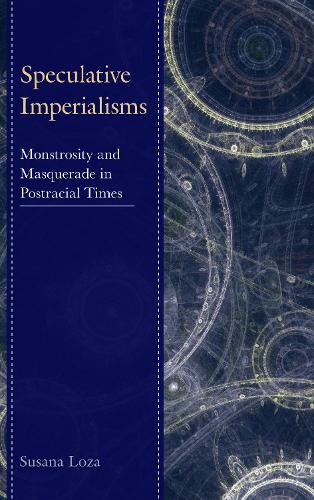
Speculative Imperialisms: Monstrosity and Masquerade in Postracial Times
(Hardback)
Publishing Details
Speculative Imperialisms: Monstrosity and Masquerade in Postracial Times
By (Author) Susana Loza
Bloomsbury Publishing PLC
Lexington Books
27th December 2017
United States
Classifications
Professional and Scholarly
Non Fiction
Literary studies: from c 2000
Film: styles and genres
Physical Properties
Hardback
204
Width 159mm, Height 239mm, Spine 22mm
490g
Description
Speculative Imperialisms: Monstrosity and Masquerade in Postracial Times explores the (settler) colonial ideologies underpinning the monstrous imaginings of contemporary popular culture in the Britain and the US. Through a close examination of District 9, Avatar, Doctor Who, Planet of the Apes, and steampunk culture, Susana Loza illuminates the durability of (settler) colonialism and how it operates through two linked yet distinct forms of racial mimicry: monsterization and minstrelsy. Speculative Imperialisms contemplates the fundamental, albeit changing, role that such racial simulations play in a putatively postracial and post-colonial era. It brings together the work on gender masquerade, racial minstrelsy, and postcolonial mimicry and puts it in dialogue with film, media, and cultural studies. This project draws upon the theoretical insights of Stuart Hall, Homi K. Bhabha, Edward Said, Philip Deloria, Michael Rogin, Eric Lott, Charles Mills, Falguni Sheth, Lorenzo Veracini, Adilifu Nama, Isiah Lavender III, Gwendolyn Foster, Marianna Torgovnick, Ann Laura Stoler, Anne McClintock, Eric Greene, Richard Dyer, and Ed Guerrero.
Reviews
Far-ranging, provocative, and so damn smart Loza takes us on a wild ride through steampunk, Doctor Who and Planet of the Apes, tracking the sinister afterlife of settler colonialism in the monstrous imaginaries of our popular culture. -- Junot Daz, Author of The Brief and Wondrous Life of Oscar Wao
Susana Lozas Speculative Imperialisms: Monstrosity and Masquerade in Postracial Times is a much needed and cutting edge critical intervention in monster studies, speculative fiction, and critical ethnic studies. Contextualized within cultural and political histories, it offers timely and intersectionally nuanced readings of popular culture that persuasively lead us to this contemporary moment in which white supremacy and imperialism have boiled over in increasingly dangerous ways. Lozas text illuminates the intricate and shifting relations of power that underlie so-called benign postracial monsters. -- Bernadette Marie Calafell, University of Denver
Author Bio
Susana Loza is associate professor of critical race, gender, and media studies at Hampshire College.
